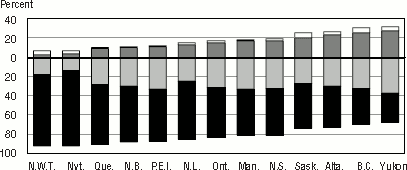
Figure 2.7
Note: This figure contains certain unreliable estimates. Consult the table 2.7 in Annex A for the standard error of each estimate.
Source: International Adult Literacy and Skills Survey, 2003.
The average scores for males and females across the four assessed domains are presented in Figure 2.8 and differences by jurisdiction are shown in Annex A Tables 2.14 A to D. For Canada, significant gender differences in average scores are evident for document literacy and for numeracy with males scoring higher than females.
With one exception, there was no notable difference in the highest and lowest scores by gender for all of the domains. In numeracy, both the lowest and the highest scores are higher for males than for females.
Although females have higher average scores on the prose literacy scale than males, the difference is small, and at only three scale points for the Canadian population as a whole is not significant (see Annex A Table 2.13). Females perform as well or better than males in prose literacy in all jurisdictions, though the difference is significant in only two jurisdictions. This difference is most pronounced in Prince Edward Island (18 score points) and Newfoundland and Labrador (15 score points).
For document literacy, males tend to have somewhat higher average scores. For Canada as a whole, males outperform females by seven score points. Gender differences in document literacy are only significant in Quebec, Ontario and British Columbia, where males out perform females (see Annex A Table 2.14 B). In the remaining provinces no significant gender differences in average document literacy scores are observed.
Gender differences are most pronounced for the numeracy domain. Males outperform females by 18 score points for the Canadian population. Males have average scores on the numeracy scale that are equal to or higher than females in all provinces and territories and the difference between males and females is significant in all jurisdictions except Newfoundland and Labrador and Prince Edward Island. In Quebec the gender difference in numeracy scores is relatively large - the average score for males is 22 points higher.